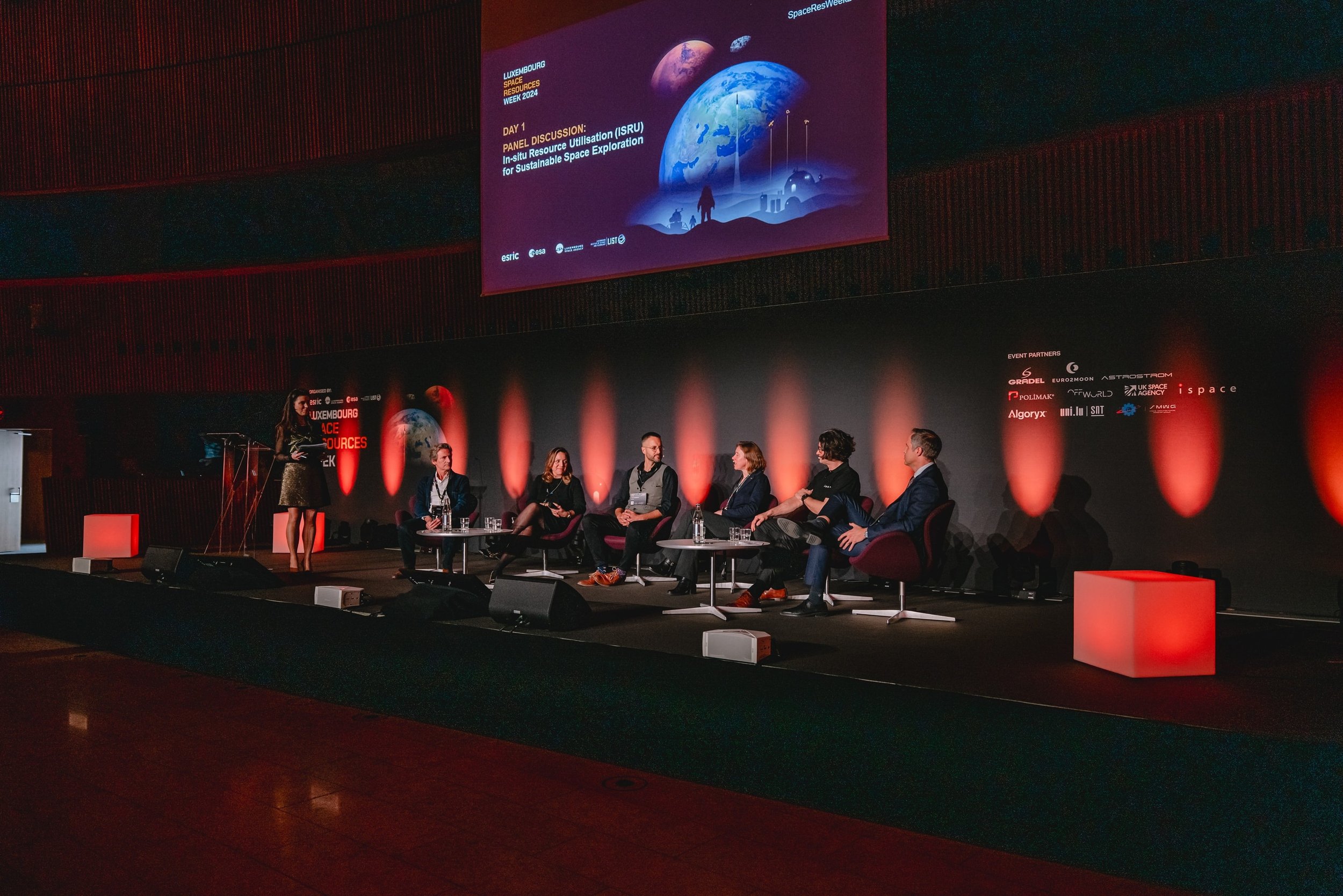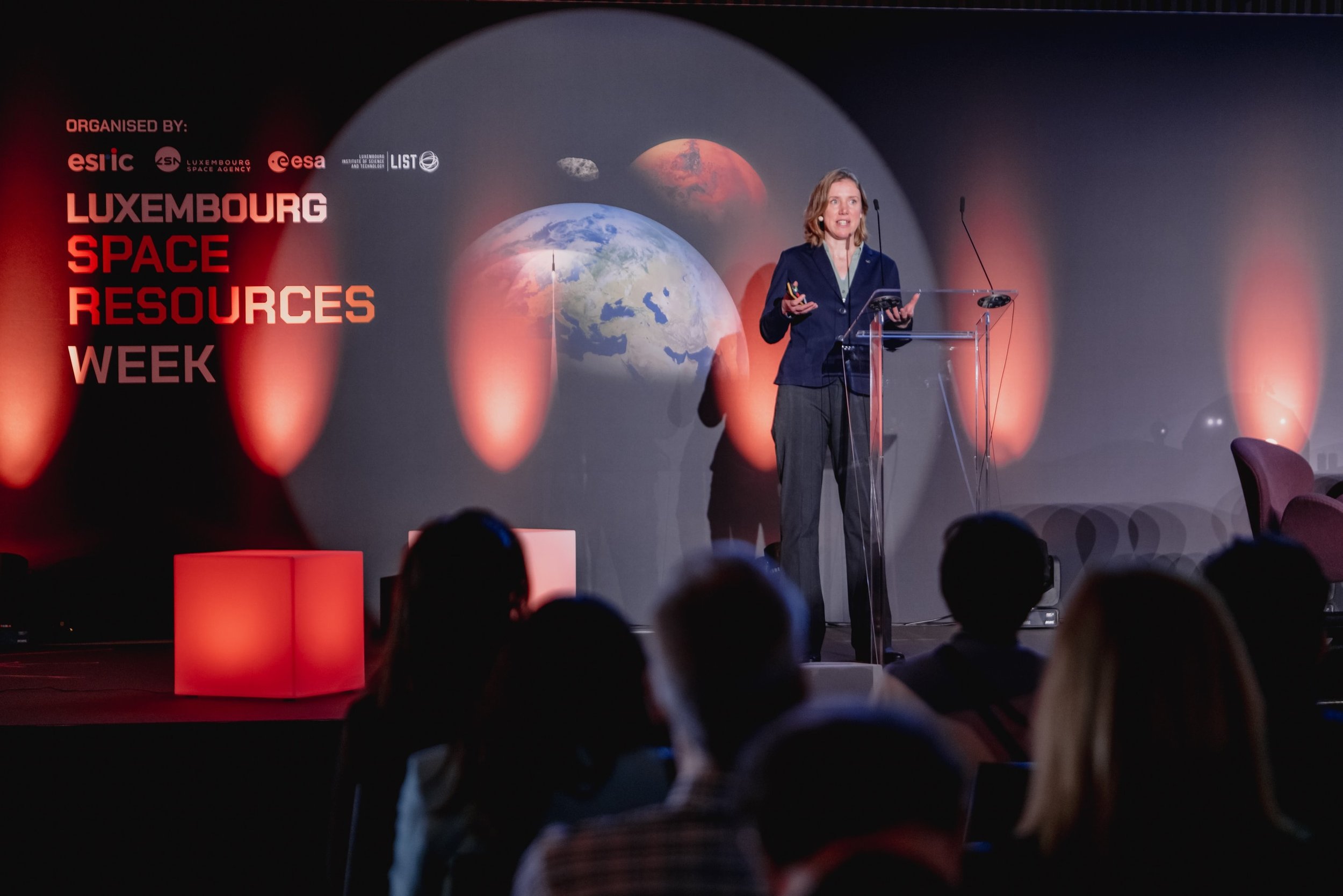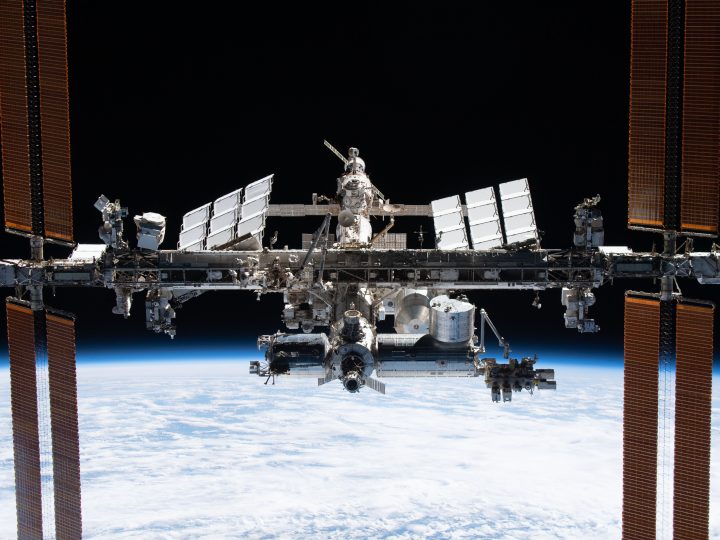Space Resources Week 2024, a cornerstone of our ISRU community-building efforts
Share this page
Organised by the European Space Resources Innovation Centre (ESRIC) in collaboration with the European Space Agency (ESA), the Luxembourg Space Agency (LSA), and the Luxembourg Institute for Science and Technology (LIST), the Space Resources Week is a cornerstone of our community-building efforts since 2018. By connecting thought leaders from space agencies, academia, research institutes, start-ups, and industry, this annual gathering has become the reference event for the international Space Resources community. It serves as a platform to share insights, exchange ideas, explore synergies and opportunities, as well as forge meaningful collaborations in the dynamic field of Space Resources.

The sixth edition of Space Resources Week took place on 25-27 March 2024 as a 3-day hybrid event at the European Convention Centre in Luxembourg (ECCL). The event provided a forum to establish priorities, enhance coordinated activities, and explore exciting new developments enabling humanity to explore further and more sustainably by using Space Resources.
With a total participation of 1200 individuals, including 550 on-site attendees from 34 different countries and 650 virtual participants, the event brought together scientists, experts, entrepreneurs, government officials, students, investors, and Space Resources enthusiasts from around the globe.
Over 109 distinguished speakers from 88 different organisations took the stage, contributing to dynamic panel discussions and presenting cutting-edge research, technologies, business models, company updates, and visionary perspectives on the latest advancements in In-Situ Space Resource Utilisation (ISRU). The conference’s success cemented its position as a cornerstone for knowledge dissemination and networking, catalysing collaboration, innovation, and progress in the field of Space Resources.

The event featured compelling keynote speeches from leading figures such as Lex Delles, Minister for the Economy of Luxembourg, Josef Aschbacher, Director General of the European Space Agency (ESA), Kathryn Hadler, Director of ESRIC, Daniel Neuenschwander, Director of Human and Robotic Exploration at ESA, Aarti Holla-Maini, Director of the United Nations Office for Outer Space Affairs (UNOOSA), Hiroshi Yamakawa, President of the Japan Aerospace Exploration Agency (JAXA), Catherine Koerner, NASA Associate Administrator for Exploration Systems Development, and Matthias Maurer, ESA Astronaut and Materials Scientist. Their speeches provided invaluable insights into the different institutional approaches to the sustainable and responsible use of Space Resources.
“Space Resource Utilisation is a dynamic, vibrant and truly multidisciplinary field, bringing together scientists, engineers, legal experts and established entrepreneurs with a common goal; to enable the sustainable exploration of space.” says Kathryn Hadler, Director of ESRIC. “Space Resources Week is a wonderful opportunity for Luxembourg to bring together the community, to facilitate discussion and to once again be the focal point for the community. I am immensely proud that ESRIC, together with its partners, LSA, LIST and ESA, is able to host such an important event in the annual calendar. This year we are particularly pleased to be also hosting the UN Expert Meeting in parallel to Space Resources Week.”

Overall, the conference played host to a significant ESA presence on the stage, with ESA officials, scientists, and experts making valuable contributions throughout the event. Their insights enriched the discussions and underscored ESA’s active engagement in accelerating the development of ISRU.
”[As ESA] We want to prepare for the future emergence of economic operators, we want to deliver prospecting missions, and of course, we want to define missions enabled by Space Resources utilisation’’, highlights Daniel Neuschwander, Director of Human and Robotic Exploration, who gave insights into ESA’s activities in the field of Space Resources on the first day of the conference.
The multidisciplinary forum of Space Resources Week was rounded off with dedicated sessions on commercial activities and business development. Alex Godlewski, Business Accelerator Officer at ESRIC, introduced the ESA BSGN Space Resources Industry Accelerator, which will be entirely dedicated to Space Resources. Managed by ESRIC, the Accelerator will support commercial projects to develop new ISRU applications and use cases for the emerging lunar economy. Scheduled for an official launch next year, the Accelerator is now in its conceptualisation phase and ESRIC is inviting partners to join the initiative in the coming months.
Are you an institution, company, or investor interested in driving ISRU forward?
Whether you are eager to collaborate with ESA in pushing the frontiers of science, become a pioneer in lunar exploration, or invest in the burgeoning lunar economy, explore opportunities on ESRIC’s website and reach out today: European Space Resources Innovation Centre – industry accelerator – ESRIC).

This year, attendees had the opportunity to engage with peers, delve into recent discoveries, and exchange ideas and expertise during a lively poster networking session featuring over 50 posters. Representatives from 16 universities, 5 research institutes, 12 companies, and several space agencies came together to showcase the latest research findings in the field. Research topics ranged from in-space manufacturing to legal and regulatory aspects, including new lunar mission concepts, regolith characterisation techniques, beneficiation methods, oxygen extraction technologies, water purification processes, and economic insights into the Space Resources value chain.
Participants also had the chance to explore the initiatives of partner organisations, agencies, and emerging start-ups in the field, discovering innovative prototypes and technologies, connecting with inspiring figures in the sector, and sharing the latest trends and success stories in the Space Resources sector at the various stands set up throughout the venue.

This year’s event coincided with the United Nations Office for Outer Space Affairs (UNOOSA) 2024 Expert Meeting which was held on 26 March 2024 at the same venue. Co-hosted by Belgium and Luxembourg and organised in cooperation with the United Nations, this meeting gathered more than 120 international experts to collect preliminary inputs for consideration at the International Conference on Space Resources held on 15 April 2024 in Vienna.
To hear more about the outcomes of Space Resources Week 2024 and gain valuable insights from this year’s esteemed speakers, including inspiring remarks from ESA’s Director General Josef Aschbacher, tune in to the latest episode of Resourceful, ESRIC’s podcast miniseries exclusively dedicated to Space Resources, now available on YouTube, Spotify, and Apple.

ON A TIGHT SCHEDULE? HERE’S AN OVERVIEW OF THE PODCAST:

This episode opens with remarks from Aarti Holla-Maini, who stresses the importance of sustainable and safe pathways for space exploration, with a focus on utilising Space Resources for in-space activities. Luxembourg’s burgeoning role in the sector is highlighted, tracing its journey from the establishment of the Luxembourg Space Agency in 2018 to the inauguration of ESRIC, the first research and innovation centre entirely dedicated to Space Resources, in 2020.
The episode explores the vital role of Space Resources in ensuring sustainable exploration. Vlada Stamenkovic, from Blue Origin, stresses that utilising space resources is not just about cutting mission costs; it is essential for sustaining human presence beyond Earth. Sustainability is a central theme, encompassing economic viability for businesses, reduced dependence on Earth’s resources, and mitigation of the impact of space exploration on terrestrial and lunar environments. Discussions revolved around the potential transfer of space technologies to Earth, promoting circular economy practices and minimising the environmental footprint of ISRU operations on the Moon’s pristine surface.
Kathryn Hadler, Director of ESRIC, shares insights into the progress made during the conference, highlighting the sector’s growth in maturity and confidence since she first participated in discussions on Space Resources in 2018. From advancements in science and technology to the emergence and evolution of business models, there has been a palpable sense of progress within the community in recent years.
The episode also makes a contrast between Europe’s cautious but steadily progressive approach to space resource utilisation and NASA’s more decisive direction. It highlights the collaborative yet competitive dynamics within the space industry, emphasising the need for cooperation between companies and space agencies.
Insights from industry leaders like Gordon Wasileski, Head of R&D at OffWorld Europe, shed light on the complexities of forging partnerships with terrestrial mining companies, highlighting the demand for innovative solutions and shared interests in sustainable practices.
Discussions at the UN expert meeting underscored the importance of developing a robust legal framework to regulate space resource activities. This highlights the need for cooperation between scientific, technological, and legal experts to effectively address the regulatory challenges of collecting and using resources in space.
The episode concludes with a forward-looking vision for the future of space exploration, highlighting the opportunity to learn from past mistakes on Earth and implement sustainable practices in space for the benefit of future generations. It stresses the importance of collaboration, sustainability, and responsible governance in shaping the future of space exploration.
Related News


